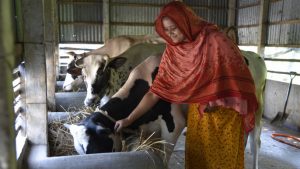The couple, who are contract milkers at Rangitata, also love to “take big jumps that might be a bit scary”.
Their business, Valleyfield Pastoral, stood for balance, profit, lifestyle, empowerment, future proofing and enjoyment – and those were their drivers.
Mr Dondertman grew up on a dairy farm in the Wairarapa but made the decision to get out of the family farm and explore other options.
He went to Massey University and completed a degree in applied science. While there, he met his future wife who was in her last year studying resource environmental planning.
Straight from leaving university, they headed to a job in Tasmania – “much to my parents’ horror”, she quipped. She had never been on a dairy farm, let alone worked in the dairy industry.
They were working for a New Zealand equity partnership that had invested in Tasmania and was converting a dairy farm with 1300 cows. There were four equity partners involved and it was $1million short on investment.
It was a “really interesting experience”. They were 100km from the nearest dairy farm and nestled between two vast stations.
“It was isolated. I didn’t know what I was doing, Josh sort of knew what he was doing, but we learned heaps,” Mrs Dondertman recalled.
That included learning about equity partnerships – and probably what not to do – and when the cows started being sold to pay their wages, they decided to move on. But one of the key things they lerant was that they loved large-scale dairy.
They headed back to Mrs Dondertman’s home patch where Mr Dondertman got a job on a 1500-cow property in Manawatu.
They enjoyed their three years there but decided they needed to keep growing in the industry and start networking.
They entered the dairy industry awards and made the national finals and, through that, they made some great friends and learned “what else is out there”. One thing they discovered was the need to surround themselves with the right people.
While reluctant to leave Manawatu, they knew if they wanted to progress, they needed to gain some new skills, including in finance.
They shifted to Hawke’s Bay where they worked for BEL Group on a property milking 2600 cows through a 60-bail rotary, and milking about 14 hours a day.
It was a “real eye-opener” for the couple and it was “hard, hard work” for two seasons, working 80-plus hours a week with very few days off, but it was also great exposure to some “awesome” people in the industry, Mrs Dondertman said.
From there, they moved to a management position with Craigmore Farming, at Culverden, where they learned a lot concerning multi-farm management.
Mrs Dondertman made use of her degree and did some environmental consulting, discovering her passion was people.
They were at Culverden for six years before recently moving to Rangitata, where they are contract milking 780 cows for Rangitata Dairies, a corporate farming operation that owns 11,000 cows.
Having two young children, life was all about balance for them and they valued the time they spent with them.
They were not out to work 80 hours a week – their goal was to work a 40-hour week – but that did not mean that they were not working hard, Mr Dondertman said.
When it came to the criteria they looked for in a job, it was always concerning people and the people they would be working for.
“Are they driven? Balanced? Can we see ourselves being comfortable having conversations with them … are they successful? Are there opportunities for personal development?
“We want to be industry leaders and we need to be continually challenging our thinking,” Mrs Dondertman said.
The couple believed if they could line up all those things, then the profit would come.
When it came to large-scale farming, an enjoyment of people was necessary.
“You have to love people. You’re going to be dealing with people every day,” she said.
You also needed to train others, have the right systems, learn to let things go, build belief in managers, give lots of feedback, let people have a go and trust the people around you, the couple said.
Asked about attracting people to the industry, Mrs Dondertman said farmers inherently believed they had to work long hours to be successful, but it had to be made an enjoyable workplace.













